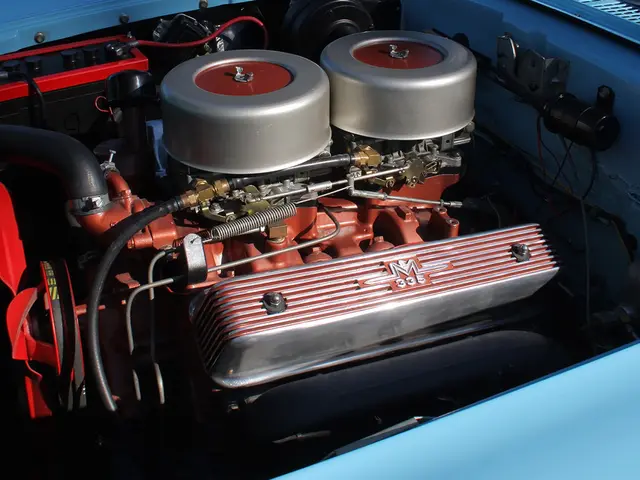Driver uprising ignites following India's introduction of E20 petrol
Thousands of drivers across India have expressed their concerns about E20 fuel on social media, following a video posted by car critic Amit Khare. This new fuel blend, which is a mix of 80% petrol and 20% ethanol, has been introduced as part of the Indian government's efforts to reduce carbon emissions, decrease crude oil imports, and support the agricultural sector [1][2].
Engine Performance and Compatibility
Studies and official statements indicate that modern vehicles, especially those produced since around 2023, are designed or adapted to be E20-compatible. This includes updated fuel lines, seals, and engine calibration [4][5]. The Research Octane Number (RON) effectively improves to 95 with E20 blending, enhancing anti-knocking properties and potentially better engine performance [3].
However, fears of a drastic drop in fuel efficiency or mileage with E20 are largely unsubstantiated. Any marginal efficiency change is often outweighed by factors such as driving habits and vehicle maintenance [3]. For older vehicles not designed for E20, manufacturers and the Society of Indian Automobile Manufacturers (SIAM) suggest checking compatibility, as some older models may require caution or may not be fully compatible [5].
Consumer Concerns
Consumer concerns primarily revolve around the compatibility of existing vehicles with E20, the availability of the fuel, and worries about mileage or engine damage. While new cars are usually compatible, older models’ warranties and performance may be impacted if E20 is used without confirmation of suitability [5].
Availability is still uneven, with some areas predominantly offering E10 (10% ethanol blend) until E20 supply chains stabilize nationwide [2]. Despite official reassurance of minimal impact and rigorous testing, worries about mileage or engine damage persist among some users [3][4].
Environmental Benefits
The ethanol programme has been successful in saving India approximately 1.06 trillion rupees (US$12.09 billion) in crude oil import costs between 2014 and 2024 [6]. It has also helped to avoid 54.4 million tonnes of carbon dioxide emissions in the same decade [7].
However, the ethanol programme has led to a reduction in the availability of grains for people and cattle due to the diversion of crops like sugarcane, maize, and rice for fuel production [8]. This has sparked debates about the balance between environmental benefits and food security.
Moving Forward
As the government aims for full implementation of E20 by 2025, car-owners like Antony Mathew from Bangalore have expressed concerns about the government pushing higher ethanol blends when cars may not be ready for them, especially considering the high tax on new petrol cars [9].
Car reviewer Amit Khare has criticized E20 fuel, stating it can damage several parts involved in supplying fuel to engines [10]. Punjab-based car critic Sunderdeep Singh has suggested making it mandatory for petrol stations to sell different blends and clearly color-code them [11].
Consumers are demanding the right to choose what they put in their cars, complaining about lower fuel efficiency, damage to older engines, and costly repairs. As the country moves towards a more sustainable future, addressing these concerns will be crucial to ensure a smooth transition to E20 fuel.
[1] https://www.thehindu.com/business/Energy-and-Environment/ethanol-will-be-blended-with-petrol-in-cities-from-october-1/article32257701.ece [2] https://www.indiatoday.in/auto/news/story/e20-petrol-to-be-launched-in-india-by-2025-govt-1810274-2021-07-22 [3] https://www.indiatoday.in/auto/news/story/e20-fuel-mileage-drop-claims-not-found-to-be-true-govt-1838797-2021-10-18 [4] https://www.financialexpress.com/auto-news/e20-fuel-in-india-all-you-need-to-know-about-the-new-ethanol-petrol-launching-soon/2362927/ [5] https://www.financialexpress.com/auto-news/e20-fuel-in-india-what-you-need-to-know-about-the-new-ethanol-blend-and-its-impact-on-your-car/2362921/ [6] https://www.livemint.com/news/india/indias-ethanol-programme-has-saved-1-06-trillion-rupees-in-crude-oil-import-costs-11634423357098.html [7] https://www.thehindu.com/news/national/ethanol-blending-helps-avoid-54-4-million-tonnes-of-co2-emissions-in-a-decade/article32346237.ece [8] https://www.thehindu.com/news/national/ethanol-blending-helps-avoid-54-4-million-tonnes-of-co2-emissions-in-a-decade/article32346237.ece [9] https://www.thehindu.com/auto/news/article32648227.ece [10] https://www.carwale.com/news/amit-khare-says-e20-fuel-can-damage-several-parts-of-your-car-273402 [11] https://www.deccanherald.com/auto/news/sunderdeep-singh-suggests-colour-coding-e20-petrol-stations-974804.html
- The move towards E20 fuel, which contains 20% ethanol, is part of India's initiatives to combat climate change by reducing carbon emissions and decreasing crude oil imports, aligning with the United Nations' Sustainable Development Goals (SDG).
- Anxious about impact on energy efficiency and engine longevity, some consumers call for more transparency in vehicle compatibility with E20, as well as clearer labelling of fuel types at petrol stations.
- Despite concerns about potential damage to older vehicle engines, the ethanol programme in India has demonstrated environmental benefits by saving millions in crude oil import costs and avoiding carbon dioxide emissions, contributing to a more sustainable and energy-efficient future.




